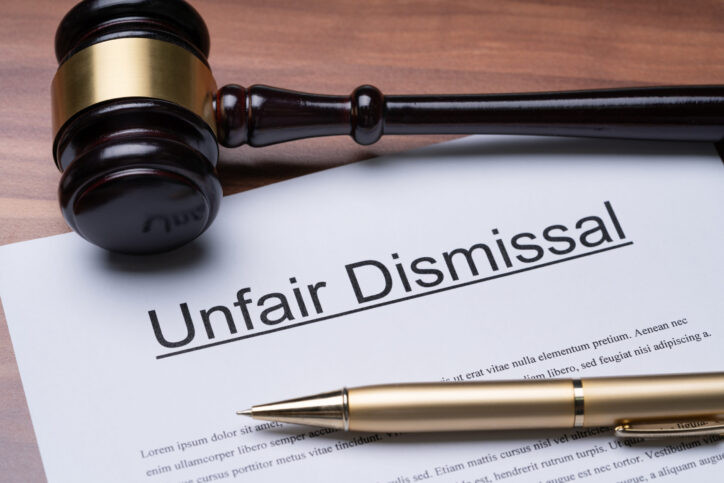On February 8, 2024, the Fair Work Commission (FWC) handed down a decision in an unfair dismissal claim involving an employee on extended absence.
Our employee relations experts examine the case and what it means for businesses.

Case facts
The applicant, Greg Healy, was employed by the Wage Inspectorate Victoria (WIV) from June 2021 until September 2023. For part of his employment, he was also a health and safety representative and a union delegate. Mr Healy submitted that during his employment, he sustained three workplace injuries. The injuries were in relation to “aggressive behaviour and adverse treatment” including bullying and harassment.
According to Mr Healy, the injuries resulted in stress and anxiety, and after the second injury he lodged a WorkCover claim. Later, in June 2021, Mr Healy also raised a number of workplace safety issues in a letter addressed to the Deputy Secretary of DPC, specifically around the workplace culture. According to Mr Healy, WIV ignored his repeated attempts to raise occupational health and safety issues that were injuring employees.
The third injury came after a period where he alleged he was the subject of adverse treatment from management and “vicarious trauma” from colleagues and union members raising their own stressful experiences with him. Mr Healy was unfit for work from October 2021 to March 2022.
In February 2022, Mr Healy received a letter from HR regarding two allegations of misconduct against him. The first one involved him publishing personal views on political and government matters on social media, which was in breach of their Code of Conduct, as well as a second allegation surrounding Mr Healy divulging personal information about a previous employee in a meeting held in January. He was invited to attend an interview on March 16, 2022, however from March 16, 2022, and for the next 18 months, Mr Healy was absent from work on personal leave. He provided medical certificates to that effect. He also submitted a second WorkCover claim, which was accepted.
WorkSafe investigation
Later that year, WorkSafe undertook an investigation regarding Mr Healy’s workplace safety complaints, which concluded that WIV was providing a safe workplace.
In April 2023 Mr Healy provided a medical report stating that he could return to work subject to a mediation taking place between the parties. WIV did not agree and directed Mr Healy to undertake an independent medical assessment, which he did. The report outlined that a three-month-long mediation process was recommended, along with a change in reporting structure. WIV refused to accommodate these requests. It stated that the workplace concerns had already been addressed, that the report did not detail how mediation would assist or what issues required mediation, and that there was no guarantee that mediation would be successful. In addition, changing the reporting structure was not a reasonable request.
As Mr Healy was still unfit for work, WIV sent him a letter providing him with an opportunity to respond to why he should not be terminated due to an inability to perform the inherent requirements of the job. Mr Healy responded to the letter, again outlining his concerns and allegations of bullying and discrimination. However, on September 13, 2023, he was terminated.
On behalf of WIV, Mr Hortle and Ms Romans van Schaik gave evidence. Mr Hortle stated that the termination was on the basis that Mr Healy was unable to perform the inherent requirements of the role, and that the medical report stated he could not return with the current management structure.
Ms Romans van Schaik submitted that all of Mr Healy’s complaints and grievances had been responded to and were addressed. She also stated that as a result of the frequency and nature of contact, she began to experience an adverse impact on her health and wellbeing.
The decision
The FWC concluded that the dismissal of Mr Healy was for a valid reason and was not unfair in all the circumstances. It stated that in cases where incapacity is the reason for dismissal, it is relevant to consider both past and future incapacity. Mr Healy had been absent for a long time, and the independent medical report from July 2023 stated that Mr Healy had no present capacity for work. In relation to future capacity, the report stated that a three-month-long mediation process was recommended, followed by a statement that Mr Healy would be unable to return to the same management structure.
The report further stated that Mr Healy could become fit for work if there were changes to the reporting process or people. He said that Mr Healy was “not able to return to the current management structure, headed by his boss”.
The FWC concluded that the decision of WIV to not engage in mediation was reasonable, as it would likely have been pointless and would have resulted in the same issues being discussed again, with the same outcome. The Commissioner found that there was no reasonable prospect of a successful outcome and for a number of reasons, including WIV concerns about the wellbeing of its staff in a mediation scenario, mediation was not appropriate in this case.
In terms of changing the management structure, the FWC stated Mr Hortle is a statutory appointee and as such cannot be removed from the position currently held.
The FWC concluded that WIV had a valid reason for dismissal, as Mr Healy was unable to return to work and there was no reasonable and imminent prospect of Mr Healy returning.
The Commission also raised that WIV also had a second valid reason for termination – which is the breach of the Code of Conduct by making certain public statements on social media about political and government matters.
Due to the complexity and risk involved when terminating an employee on extended absence, CCIWA strongly recommends that employers contact the Employee Relations Advice Centre on 08 (9365 7660) or via [email protected] to seek further advice prior taking any action.












